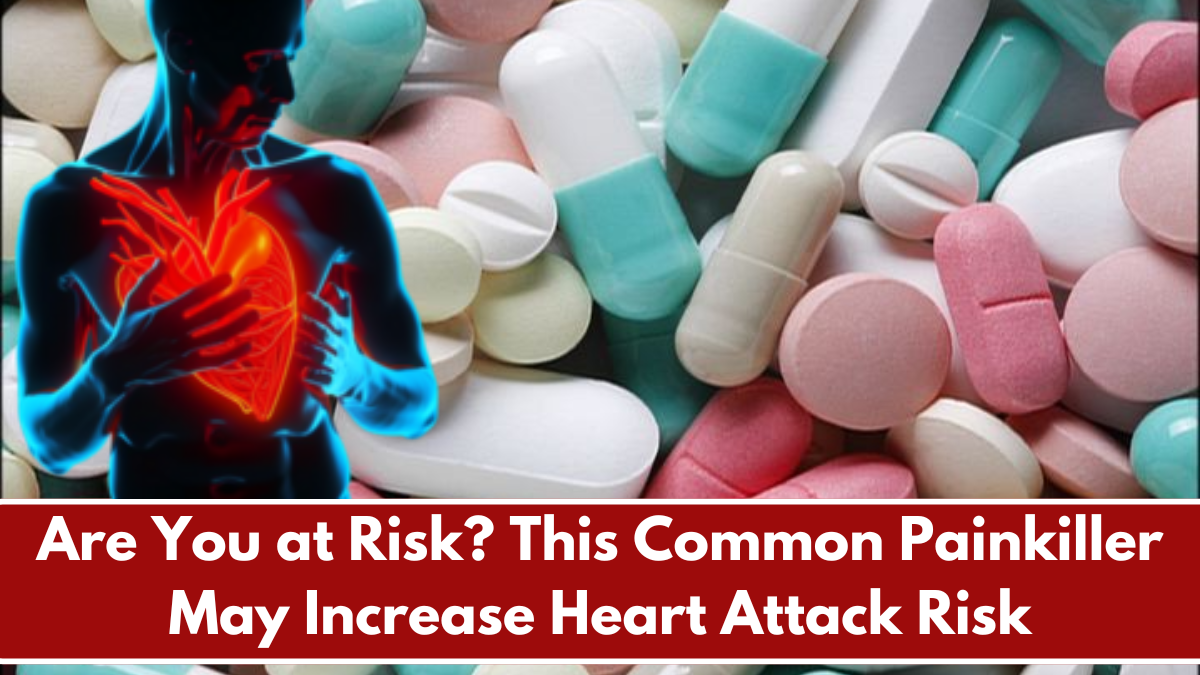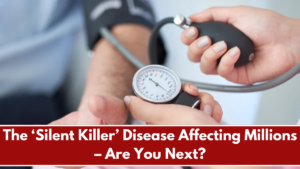Millions of people rely on over-the-counter painkillers to relieve headaches, muscle aches, joint pain, and fevers. These medications are so common that most households have at least one type in their medicine cabinet. However, recent scientific research has revealed a shocking truth—one of the most commonly used painkillers may significantly increase the risk of a heart attack.
While these medications are generally considered safe when used correctly, excessive or prolonged use can pose serious health risks. This article will explore which painkiller is linked to heart attack risk, how it affects the heart, who is most vulnerable, and what safer alternatives exist. If you or a loved one frequently takes pain relievers, understanding the potential dangers could be life-saving.
The Painkiller in Question: NSAIDs and Cardiovascular Risks
The category of painkillers raising concerns includes nonsteroidal anti-inflammatory drugs (NSAIDs), which are widely used for pain and inflammation relief. Some of the most well-known NSAIDs include:
- Ibuprofen (Advil, Motrin)
- Naproxen (Aleve)
- Celecoxib (Celebrex)
- Diclofenac (Voltaren)
These drugs work by blocking enzymes (COX-1 and COX-2) responsible for inflammation and pain. However, they can also increase blood pressure, reduce blood vessel flexibility, and promote blood clot formation—factors that may contribute to heart attack risk.
Several studies have linked long-term or high-dose use of NSAIDs to an increased likelihood of cardiovascular events, including heart attacks, strokes, and high blood pressure.
How NSAIDs Increase Heart Attack Risk
- Increased Blood Pressure
NSAIDs can lead to fluid retention and kidney function changes, which in turn can cause a rise in blood pressure. High blood pressure (hypertension) is a leading risk factor for heart attacks. - Blood Clot Formation
Some NSAIDs interfere with platelet function, making the blood more likely to clot. A blood clot blocking an artery can trigger a heart attack. - Narrowing of Blood Vessels
Research suggests that NSAIDs may constrict blood vessels, reducing the heart’s ability to get enough oxygen-rich blood. This can contribute to coronary artery disease (CAD), which increases heart attack risk. - Disrupting the Balance of Prostaglandins
NSAIDs block prostaglandins, which help regulate blood flow and protect the heart. This disruption may increase the likelihood of heart-related complications.
Who Is Most at Risk?
Not everyone who takes NSAIDs will experience heart problems, but certain groups are more vulnerable to their effects. These include:
- People with preexisting heart conditions (such as heart disease or previous heart attacks).
- Individuals with high blood pressure or those at risk of developing hypertension.
- Older adults (over 65 years old), as their cardiovascular systems are more fragile.
- People who use NSAIDs frequently or in high doses over extended periods.
- Smokers and individuals with high cholesterol, both of whom already have increased cardiovascular risk.
If you fall into any of these categories, it is essential to talk to your doctor before taking NSAIDs regularly.
What the Research Says About NSAIDs and Heart Attacks
Recent studies have raised serious concerns about NSAID safety. Some key findings include:
- A study published in the BMJ (British Medical Journal) found that using NSAIDs for just one week was associated with a 31% increased risk of a heart attack.
- A large-scale analysis in the European Heart Journal concluded that high doses of ibuprofen and diclofenac increased the risk of major cardiovascular events.
- The FDA (Food and Drug Administration) issued a warning stating that NSAIDs can increase the risk of heart attacks and strokes, even with short-term use.
How to Use NSAIDs Safely
If you need to take NSAIDs, consider the following precautions to reduce your heart attack risk:
- Use the lowest effective dose for the shortest possible time.
- Avoid taking NSAIDs daily unless prescribed by a doctor.
- Monitor your blood pressure regularly if you use NSAIDs frequently.
- Opt for alternative pain relief methods when possible.
Safer Alternatives to NSAIDs
If you are concerned about the risks associated with NSAIDs, there are several safer pain relief options:
- Acetaminophen (Tylenol) – Unlike NSAIDs, acetaminophen does not increase heart attack risk and is a good alternative for pain relief. However, excessive use can harm the liver.
- Natural Anti-Inflammatory Remedies – Options like turmeric, ginger, and omega-3 fatty acids have been shown to reduce inflammation and pain without harmful cardiovascular effects.
- Physical Therapy and Exercise – Gentle stretching, yoga, and physical therapy can reduce chronic pain without medication.
- Topical Pain Relievers – Gels and creams containing menthol, capsaicin, or lidocaine provide local pain relief without affecting the heart.
- Cold and Heat Therapy – Alternating between ice packs and heating pads can be an effective way to manage pain.
Conclusion: Protecting Your Heart While Managing Pain
Painkillers like ibuprofen and naproxen may seem harmless, but growing evidence suggests they could significantly increase heart attack risk, especially with long-term or high-dose use. Understanding these risks is crucial for making informed decisions about pain management.
If you rely on NSAIDs for pain relief, consider talking to your doctor about safer alternatives that won’t compromise your heart health. Reducing your dependency on NSAIDs, making lifestyle changes, and exploring natural pain relief methods can help keep both your heart and body healthy.
The next time you reach for a painkiller, remember: your heart health is just as important as pain relief. Take precautions, use NSAIDs wisely, and consider alternative solutions to protect yourself from potential cardiovascular dangers.
FAQ’s:
1. Which painkiller is linked to an increased risk of heart attack?
The main category of painkillers linked to heart attack risk is nonsteroidal anti-inflammatory drugs (NSAIDs). These include ibuprofen (Advil, Motrin), naproxen (Aleve), diclofenac (Voltaren), and celecoxib (Celebrex). Studies have shown that long-term or high-dose use of these medications can significantly increase the risk of cardiovascular events, including heart attacks, strokes, and high blood pressure. The reason behind this is that NSAIDs can raise blood pressure, cause fluid retention, and make blood more prone to clotting, all of which contribute to an increased heart attack risk.
2. How do NSAIDs increase the risk of heart attacks?
NSAIDs increase heart attack risk through several mechanisms. First, they can raise blood pressure by causing the body to retain more sodium and water, putting extra strain on the heart. Second, they can reduce blood vessel flexibility, making it harder for the heart to pump blood efficiently. Third, NSAIDs can promote blood clot formation, which can block arteries and lead to a heart attack. Lastly, they disrupt prostaglandin balance, which normally helps protect the heart and regulate blood circulation. These combined effects can be dangerous, especially for those with existing heart conditions.
3. How much does using NSAIDs increase heart attack risk?
The exact risk depends on dosage, duration, and individual health factors. According to research, taking NSAIDs for just one week can increase heart attack risk by 20-50%, depending on the specific drug and dose. A study published in the BMJ found that using high-dose ibuprofen (2400 mg/day) or diclofenac (150 mg/day) increased heart attack risk by up to 50%. Even short-term use (as little as one to two weeks) has been associated with higher risks. The longer and more frequently NSAIDs are taken, the greater the danger to heart health.
4. Who is most at risk of heart problems from NSAIDs?
Certain groups of people face a higher risk of heart complications from NSAID use, including:
- Individuals with pre-existing heart disease or a history of heart attacks.
- People with high blood pressure, as NSAIDs can further elevate blood pressure.
- Older adults (65+), since aging naturally increases cardiovascular risks.
- People who take NSAIDs frequently or at high doses over long periods.
- Smokers and those with high cholesterol, both of whom already have a greater risk of heart disease.
If you fall into any of these categories, it is especially important to consult a doctor before using NSAIDs regularly.
5. Are some NSAIDs safer for the heart than others?
While all NSAIDs carry some heart risks, studies suggest that naproxen (Aleve) may have a lower risk compared to ibuprofen or diclofenac. However, it is not completely risk-free. Selective COX-2 inhibitors like celecoxib (Celebrex) were originally marketed as being safer for the stomach but have been found to increase heart attack risk just like traditional NSAIDs. The best approach is to use any NSAID at the lowest effective dose for the shortest possible duration. If you have heart disease, ask your doctor about alternative pain relief options.
6. Can I take NSAIDs if I have high blood pressure?
If you have high blood pressure, you should be cautious with NSAIDs. These drugs can cause fluid retention and reduce kidney function, leading to higher blood pressure levels. Over time, this can increase strain on the heart and contribute to cardiovascular disease. If you need a painkiller and have high blood pressure, talk to your doctor about alternatives such as acetaminophen (Tylenol), physical therapy, or natural anti-inflammatory treatments like turmeric or omega-3 supplements.
7. What are some safer alternatives to NSAIDs for pain relief?
If you’re concerned about NSAID risks, there are several alternative pain relief options:
- Acetaminophen (Tylenol): Does not increase heart attack risk, but should be used cautiously to avoid liver damage.
- Topical pain relievers: Creams and gels with menthol, capsaicin, or lidocaine can provide localized relief.
- Heat and cold therapy: Applying heat for stiffness or cold for inflammation can be effective.
- Physical therapy and exercise: Stretching, yoga, and low-impact workouts can reduce chronic pain.
- Dietary changes: Anti-inflammatory foods like turmeric, ginger, and omega-3 fatty acids can help with pain naturally.
Always consult a healthcare provider before switching to a new pain relief method, especially if you have underlying health conditions.
8. What should I do if I need to take NSAIDs regularly?
If you need to take NSAIDs frequently, take these precautions to minimize heart risks:
- Use the lowest effective dose and take it only when necessary.
- Avoid long-term use unless prescribed by a doctor.
- Monitor your blood pressure regularly to catch any increases early.
- Stay hydrated and maintain a heart-healthy diet to support cardiovascular function.
- Consider alternative pain management methods whenever possible.
If you find yourself relying on NSAIDs daily, consult your doctor to discuss alternative treatments or strategies to reduce dependency.
9. Are over-the-counter NSAIDs as dangerous as prescription-strength ones?
Yes, even over-the-counter (OTC) NSAIDs carry risks, especially when taken in high doses or for extended periods. Many people assume that OTC drugs are completely safe, but research has shown that commonly used doses of ibuprofen and naproxen can still contribute to heart attack risk. Prescription NSAIDs typically come in higher doses, increasing the risk further. The key takeaway is that all NSAIDs, whether OTC or prescription, should be used with caution.
10. Should I stop taking NSAIDs altogether?
Not necessarily. NSAIDs can be very effective for short-term pain relief and are generally safe when used properly. However, if you are at high risk for heart disease or take NSAIDs frequently, you should consider alternatives or consult your doctor about the safest approach. The goal is to balance pain management with heart health. If NSAIDs are necessary, use them responsibly, watch for warning signs like chest pain or shortness of breath, and be mindful of potential cardiovascular risks.



